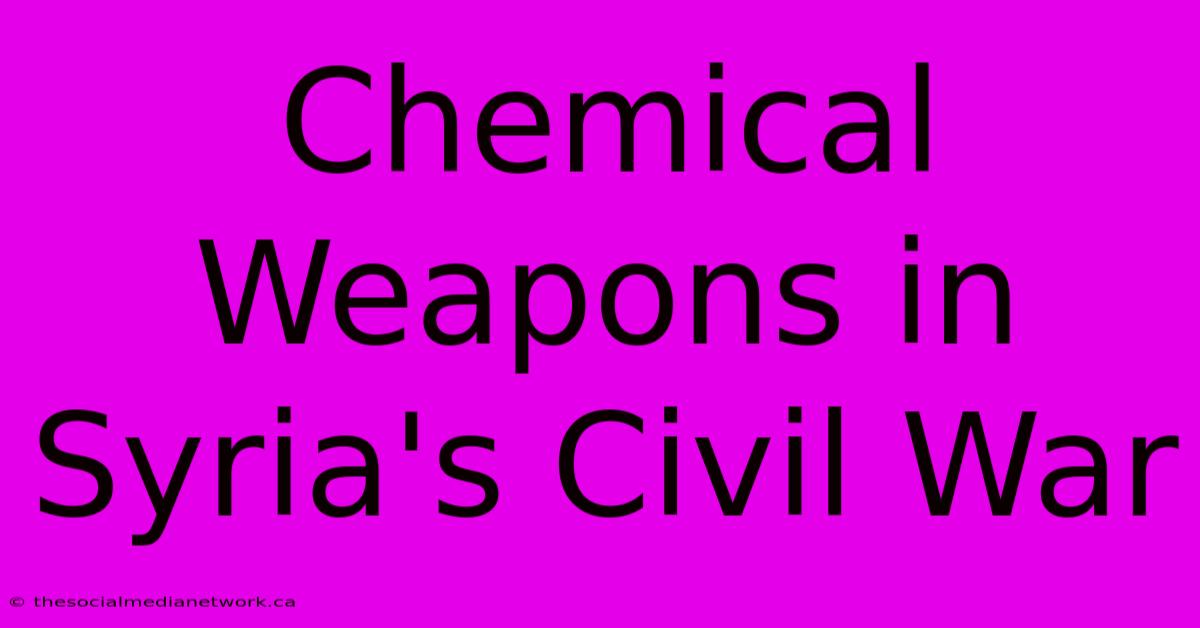Chemical Weapons In Syria's Civil War

Discover more detailed and exciting information on our website. Click the link below to start your adventure: Visit Best Website meltwatermedia.ca. Don't miss out!
Table of Contents
Chemical Weapons in Syria's Civil War: A Brutal Legacy
The Syrian Civil War, a brutal conflict that began in 2011, has been marred by the horrific use of chemical weapons. This devastating tactic, a violation of international law, has inflicted immense suffering on civilians and combatants alike, leaving an indelible scar on the nation's history. Understanding the context, perpetrators, and consequences of these attacks is crucial to grasping the full complexity of the Syrian conflict.
The Grim Reality: Types of Chemical Weapons Used
Several types of chemical weapons have been documented in Syria, each with its own devastating effects:
- Sarin: A highly toxic nerve agent causing respiratory failure, paralysis, and death. Its use in Ghouta in 2013 stands as one of the most infamous incidents.
- Chlorine: Though less lethal than nerve agents, chlorine gas is a suffocating agent causing severe respiratory distress and, in high concentrations, death. Its use has been widely reported throughout the conflict.
- Mustard gas: A blister agent causing severe burns, blindness, and long-term health problems. Its use, while less frequent, has added another layer of horror to the war.
Who is Responsible? A Complex Web of Accusations
Pinpointing responsibility for chemical weapons attacks in Syria has been a complex and highly politicized process. The Syrian government, under Bashar al-Assad, has been repeatedly accused of using chemical weapons against rebel groups and civilians. Investigations by international organizations like the OPCW (Organisation for the Prohibition of Chemical Weapons) have corroborated many of these accusations. However, other armed groups within Syria have also been implicated, though on a smaller scale. This complex web of accusations highlights the challenges in assigning culpability amid the chaos of war.
The OPCW's Role: Investigation and Accountability
The OPCW, the international body responsible for enforcing the Chemical Weapons Convention, has played a vital role in investigating alleged chemical weapons attacks in Syria. Their meticulous on-site investigations, sample analysis, and reports have provided crucial evidence, even though facing significant obstacles in accessing conflict zones. While their findings have often been instrumental in holding perpetrators accountable, the process of achieving justice has been slow and fraught with political complexities.
The Human Cost: A Legacy of Suffering
The use of chemical weapons in Syria has resulted in catastrophic humanitarian consequences. Thousands of civilians and combatants have been killed or injured, suffering from acute and long-term health problems. The psychological trauma inflicted on survivors is immeasurable, adding to the already immense suffering caused by the war. Children have been particularly vulnerable, suffering from severe respiratory illness and lasting disabilities.
Real-Life Example: The Ghouta Attack (2013)
The August 21, 2013, sarin gas attack in Ghouta remains one of the most horrifying examples of chemical weapons use in the Syrian Civil War. Hundreds of civilians, including many children, were killed in this attack, sparking international outrage and prompting increased pressure on the Assad regime. This event highlighted the indiscriminate nature of chemical weapons and the urgent need for international action to prevent their future use.
Looking Ahead: The Ongoing Challenge
Despite the destruction of Syria's declared chemical weapons stockpile under the supervision of the OPCW, the risk of future chemical weapons use remains. The ongoing conflict, the presence of various armed groups, and the lack of complete accountability continue to create a volatile environment. International efforts to ensure the elimination of chemical weapons and bring those responsible for their use to justice remain crucial to preventing further atrocities.
Frequently Asked Questions (FAQs)
- What is the Chemical Weapons Convention? The Chemical Weapons Convention is an international treaty that prohibits the development, production, stockpiling, and use of chemical weapons. Syria is a signatory to this convention.
- How are chemical weapons attacks investigated? Investigations typically involve on-site inspections by organizations like the OPCW, collection of samples for analysis, witness testimonies, and examination of available evidence.
- What are the long-term effects of exposure to chemical weapons? Long-term effects can include respiratory problems, neurological damage, blindness, skin lesions, and various cancers.
- What international efforts are being made to address the use of chemical weapons in Syria? The OPCW continues its investigative efforts, while international pressure and sanctions aim to deter further use and hold perpetrators accountable.
- What is the role of the UN in addressing this issue? The UN Security Council has passed several resolutions condemning the use of chemical weapons in Syria and demanding accountability.
The Syrian Civil War's legacy extends far beyond its physical destruction. The widespread and documented use of chemical weapons underscores the profound moral failure inherent in such atrocities. Continued vigilance, international cooperation, and a sustained commitment to accountability are crucial in preventing a repetition of this horrific chapter in history.

Thank you for visiting our website wich cover about Chemical Weapons In Syria's Civil War. We hope the information provided has been useful to you. Feel free to contact us if you have any questions or need further assistance. See you next time and dont miss to bookmark.
Featured Posts
-
Ket Qua Myanmar Vs Indonesia 0 1
Dec 10, 2024
-
Independiente Vs Atletico Tucuman Ao Vivo
Dec 10, 2024
-
Rettungsaktion Sturz Aus 18 Metern Hoehe
Dec 10, 2024
-
Udinese Vence Al Monza Fuera De Casa
Dec 10, 2024
-
Flamengo Escolhe Novo Presidente Rumo Ao Futuro
Dec 10, 2024
